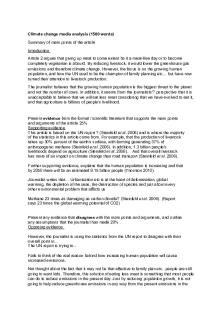ENGL120 Assignment 2 – Critical Analysis PDF

| Title | ENGL120 Assignment 2 – Critical Analysis |
|---|---|
| Course | Approaches to English Literature |
| Institution | Macquarie University |
| Pages | 2 |
| File Size | 86.2 KB |
| File Type | |
| Total Downloads | 11 |
| Total Views | 159 |
Summary
Download ENGL120 Assignment 2 – Critical Analysis PDF
Description
ENGL120 Assignment 2 – Textual Analysis ‘Little Red-Cap’ by Carol Ann Duffy
In her poem ‘Little Red-Cap’, Carol Ann Duffy addresses the negative theme of neglecting innocence and the positive theme of first love through the contrasting ideas towards her experiences of growing up and leaving the comfort of childhood. While taking on the ideology of the classic fairy tale, ‘Little Red Riding Hood’, there is sufficient evidence of ‘Little Red Cap’ being Duffy’s reality and own life. The theme of neglecting innocence is rendered through the direct associations with leaving her childhood behind and finding the wolf to be her companion. However, the narrator forms a tender love for the beast through the ideology of first love.
There is an act of sex between the narrator and the wolf which contributes to her negligence of innocence, this was a way of signifying her departure from childhood into adulthood. The wolf, depicted as a beast with predator-like implications, becomes a source for the narrator escaping her own reality of her life. Carol Ann Duffy describes the act to be of negligence, as she made sure to go out of her way and let the wolf spotted her to lead her to his house. For example, “I made quite sure he spotted me, sweet sixteen, never been, babe, waif, and bought me a drink” (11-12) is written by Duffy to suggest that the narrator is neglecting her childhood to rush to become an adult, symbolism is used here to carefully explain Duffy’s meeting of her own ‘wolf’. However, with the wolf being her first love, there is an indication of virginity being willingly given in “went in search of a living bird-white dove-which flew, straight, from my hands, to his open mouth” (24-25). This is symbolic to the fact that it adds a new dimension to their relationship and love.
Corresponding to this, Duffy brings elements of her own life into the poem. Out of the Forest I come (Roche-Jacques) suggests that there is an autobiographical view on ‘Little Red cap’ which is derived straight from Duffy. The neglect of her innocence is shown when she is age 17 and falls for the poet Adrian Henri, 23 years older than her, which the poem is loosely based on. Duffy portrays herself as the Little Red Cap and Henri as the wolf. The basis of their relationship is suggested through ‘Fall in love with and have a relationship with the wolf. … Little Red Cap, a teenage female poet, learns from” (pp. 367) further implicating that Duffy neglected her childhood and fell in love with her first love, whom was also a poet, just like the wolf. It is then further suggested that her poem takes on the form of her own life as it “becomes the opposite of the original fairy tale, in which Little Red Cap fears she will be consumed by the wolf, and says that the piece is based on her own first relationship” (pp. 367). This adds to the ideology of first love and how it can cause negligence of innocence in ‘Little Red Cap’ and her own life.
Reference: Carol Ann Duffy, ‘Little Red-Cap’, (1999), The Norton Anthology of Poetry, ed. Margaret Ferguson et al., 5th ed. (New York and London: Norton, 2005), pp. 2008-2009; biographical sketch p. 2091
Roche-Jacques, Shelley. “‘Out of the Forest I come’: Lyric and Dramatic Tension in the World’s Wife.” Language and Literature, vol. 25, no. 4, 2016, pp. 363-375....
Similar Free PDFs

Critical Thinking Assignment 2
- 6 Pages

Critical Analysis
- 6 Pages

Critical Thinking Assignment 3-2
- 2 Pages

Critical Thinking Assignment 4-2
- 2 Pages

Critical Thinking Assignment 6-2
- 2 Pages

ENGL120 Grammar 6-2 Verb Patterns #2
- 24 Pages

Assignment 2 - Marketing Analysis
- 15 Pages

Assignment 2 - Country Analysis
- 11 Pages

SWOT Analysis Assignment(2)
- 3 Pages

Assignment 2 System Analysis
- 9 Pages

ENGL120 Grammar 5-2 Future #2
- 23 Pages

5.10 Critical Analysis
- 5 Pages
Popular Institutions
- Tinajero National High School - Annex
- Politeknik Caltex Riau
- Yokohama City University
- SGT University
- University of Al-Qadisiyah
- Divine Word College of Vigan
- Techniek College Rotterdam
- Universidade de Santiago
- Universiti Teknologi MARA Cawangan Johor Kampus Pasir Gudang
- Poltekkes Kemenkes Yogyakarta
- Baguio City National High School
- Colegio san marcos
- preparatoria uno
- Centro de Bachillerato Tecnológico Industrial y de Servicios No. 107
- Dalian Maritime University
- Quang Trung Secondary School
- Colegio Tecnológico en Informática
- Corporación Regional de Educación Superior
- Grupo CEDVA
- Dar Al Uloom University
- Centro de Estudios Preuniversitarios de la Universidad Nacional de Ingeniería
- 上智大学
- Aakash International School, Nuna Majara
- San Felipe Neri Catholic School
- Kang Chiao International School - New Taipei City
- Misamis Occidental National High School
- Institución Educativa Escuela Normal Juan Ladrilleros
- Kolehiyo ng Pantukan
- Batanes State College
- Instituto Continental
- Sekolah Menengah Kejuruan Kesehatan Kaltara (Tarakan)
- Colegio de La Inmaculada Concepcion - Cebu



